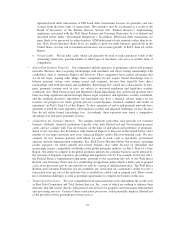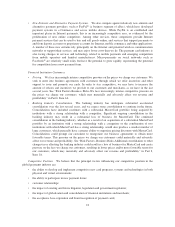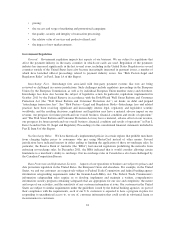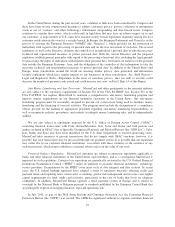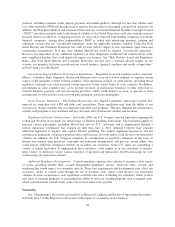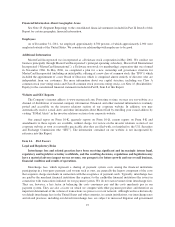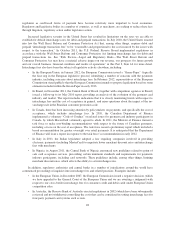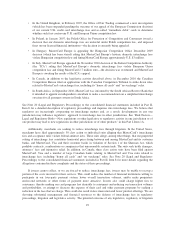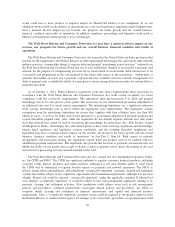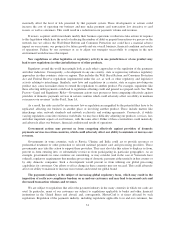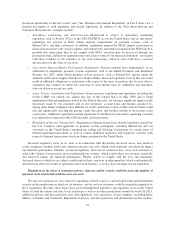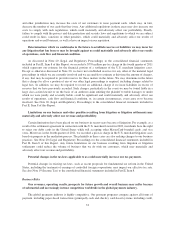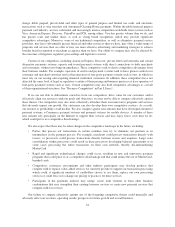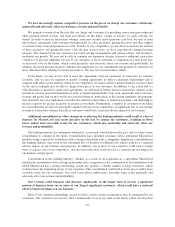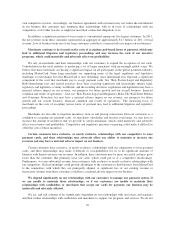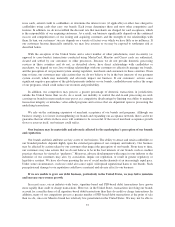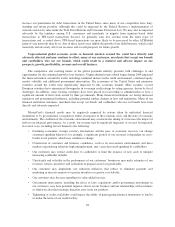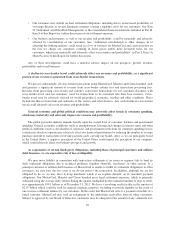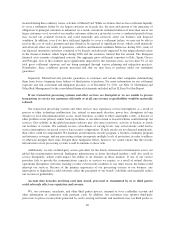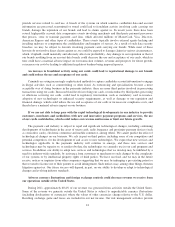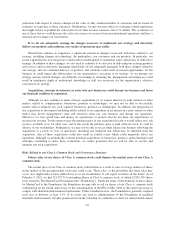MasterCard 2011 Annual Report Download - page 36
Download and view the complete annual report
Please find page 36 of the 2011 MasterCard annual report below. You can navigate through the pages in the report by either clicking on the pages listed below, or by using the keyword search tool below to find specific information within the annual report.increased significantly in the last several years. See “Business-Government Regulation” in Part I, Item 1 for a
detailed description of such regulation and related legislation. In addition to the Wall Street Reform and
Consumer Protection Act, examples include:
•Anti-Money Laundering and Anti-Terrorism—MasterCard is subject to anti-money laundering
regulation, such as Section 352(a) of the USA PATRIOT Act in the United States and an anti-money
laundering law enacted in India (which imposes requirements on payment systems, such as
MasterCard’s, and their customers). In addition, regulations imposed by OFAC impose restrictions on
financial transactions with certain countries and with persons and entities included on the SDN List. It is
possible that transactions that do not comply with OFAC sanctions may be processed through our
payment system, and that our reputation may suffer due to some of our financial institutions’ association
with these countries or the existence of any such transactions, which in turn could have a material
adverse effect on the value of our stock.
•Government-Imposed Market Participation Regulations—Several countries have implemented, or are
authorized to implement, payment systems regulation, such as the Indian Payments and Settlement
Systems Act 2007, under which payment system operators, such as MasterCard, operate under the
authority and broad oversight of the Reserve Bank of India. Increased regulatory focus in this area could
result in additional obligations or restrictions with respect to the types of products that we may offer to
consumers, the countries in which our cards may be used and the types of cardholders and merchants
who can obtain or accept our cards.
•Issuer Practice Legislation and Regulation—Issuer practices legislation and regulation, including the
Credit CARD Act (which was signed into law in the United States in May 2009 and is being
implemented through regulations issued by the Federal Reserve), are having a significant impact on the
disclosures made by our customers and on our customers’ account terms and business practices by,
among other things, making it more difficult for credit card issuers to price credit cards for future credit
risk and significantly affecting the pricing, credit allocation, and business models of most major credit
card issuers. Additional regulations include regulations by the Board of Governors regulating overdraft
fees imposed in connection with ATM and debit card transactions.
•Regulation of Internet Transactions—Regulation of Internet transactions include legislation enacted by
the U.S. Congress (and applicable to payment system participants, including MasterCard and our
customers in the United States) requiring the coding and blocking of payments for certain types of
Internet gambling transactions, as well as various additional legislative and regulatory activities with
respect to Internet transactions which are being considered in the United States.
Increased regulatory focus on us, such as in connection with the matters discussed above, may result in
costly compliance burdens and/or may otherwise increase our costs, which could materially and adversely impact
our financial performance. Similarly, increased regulatory focus on our customers may cause such customers to
reduce the volume of transactions processed through our systems, which could reduce our revenues materially
and adversely impact our financial performance. Finally, failure to comply with the laws and regulations
discussed above to which we are subject could result in fines, sanctions or other penalties, which could materially
and adversely affect our results of operations and overall business, as well as have an impact on our reputation.
Regulation in the areas of consumer privacy, data use and/or security could decrease the number of
payment cards issued and could increase our costs.
We and our customers are also subject to regulations related to privacy and data protection and information
security in the jurisdictions in which we do business, and we and our customers could be negatively impacted by
these regulations. Recently, these topics have received heightened legislative and regulatory focus in the United
States (at both the federal and state level), in Europe as well as in other jurisdictions around the world. In 2011,
additional privacy and data protection laws and regulations were enacted in several countries, including India,
Mexico, Colombia and Venezuela. Regulation of privacy and data protection and information security in these
32


